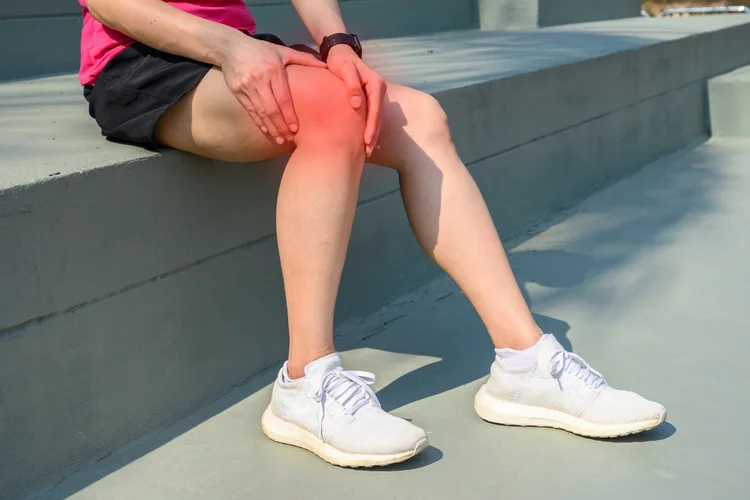Anti-Inflammatory Medicine for Orthopaedic Conditions
Information reviewed by: Dr Foo Gen Lin | Last updated: Feb 20, 2026
Is joint pain and swelling from an injury or condition affecting your daily activities? Dr Foo provides a holistic approach to rehabilitation and recovery, including anti-inflammatory medicine to manage your symptoms.
MBBS (University of London) | MMed (Ortho) | FRCSEd (Ortho) | FAMS (Ortho)


What Are Anti-inflammatory Medicines?

Anti-inflammatory medicines help reduce inflammation, pain, and swelling caused by
injuries or orthopaedic conditions such as osteoarthritis, tendonitis, and
conditions like runner’s knee.
They are often part of a broader treatment plan that includes
physiotherapy, lifestyle modifications, and other medical interventions to manage these
conditions and support long-term recovery.
Types of Anti-Inflammatory Medicines
There are two main categories of anti-inflammatory medicines:
1. Non-Steroidal Anti-Inflammatory Drugs (NSAIDs)
NSAIDs work by inhibiting enzymes called
cyclooxygenases (COX-1 and COX-2), which are involved in the production of prostaglandins,
the chemicals that trigger inflammation and pain. By blocking these enzymes, they help alleviate
swelling, stiffness, and discomfort.
NSAIDs are commonly taken orally to manage mild to moderate pain and inflammation and are typically
available over the counter or by prescription.
2. Corticosteroids
These are synthetic hormones that mimic the
body’s natural anti-inflammatory response. Unlike NSAIDs, which provide general pain relief,
corticosteroids are typically used for more severe or persistent inflammation.
They are often administered via injection directly into affected joints or tissues to reduce
swelling and pain in conditions such as bursitis or arthritis.
When Are Anti-inflammatory Medicines Used in Orthopaedics?
Orthopaedic specialists or sports doctors may prescribe anti-inflammatory medicines to manage various musculoskeletal conditions, including:
1. Acute Injuries (Sudden Trauma or Overuse)

- Sports Injuries – Sprains, strains, ligament tears (e.g., ACL injuries), runner’s knee, and rotator cuff injuries, often causing swelling, stiffness, and movement restriction.
- Fractures and Bone Injuries – Includes stress fractures and traumatic fractures, which can result in significant pain, swelling, and delayed healing.
- Post-Surgical Recovery – Swelling and discomfort that commonly occur after orthopaedic procedures such as joint repair (e.g., meniscus repair) or ligament reconstruction (e.g., ACL reconstruction).
2. Arthritis and Joint Disorders
- Osteoarthritis – A degenerative condition that wears down joint cartilage, leading to stiffness, swelling, and joint pain, especially in weight-bearing joints such as the knees, hips, and shoulder.
- Rheumatoid Arthritis – An autoimmune disease causing chronic joint inflammation, which leads to persistent pain, swelling, and reduced mobility.
- Frozen Shoulder (Adhesive Capsulitis) – A condition where the shoulder joint capsule thickens, restricting movement and causing progressive pain.
- Joint Inflammation from Crystal Deposits (e.g., Gout) – Sudden and severe joint pain caused by uric acid or calcium crystal buildup, commonly affecting the toes, knees, or ankles.
3. Chronic Soft Tissue Inflammation

- Tendinopathies – Chronic irritation of tendons, including Achilles tendinitis, tennis elbow, golfer’s elbow, patellar tendinitis, and rotator cuff tendinopathy, often leading to persistent pain with movement.
- Bursitis – Inflammation of fluid-filled sacs that cushion joints, commonly affecting the shoulder, hip, knee, or elbow, causing localised pain and swelling.
- Plantar Fasciitis – Inflammation of the connective tissue in the foot, leading to sharp heel pain, particularly in the morning or after long periods of standing.
- Iliotibial (IT) Band Syndrome – Overuse injury causing outer knee pain, often seen in runners and cyclists.
- De Quervain’s Tenosynovitis – Inflammation of the tendons in the wrist and thumb, causing pain and difficulty gripping objects.
4. Spinal and Nerve-Related Pain
- Lower Back Pain – Conditions such as lumbar strain, sciatica, herniated discs, and facet joint irritation, which can lead to stiffness, radiating pain, and limited mobility.
- Nerve Compression Syndromes – Conditions like carpal tunnel syndrome, which cause nerve pain, tingling, and weakness due to inflammation.
What Are Commonly Used NSAIDs?
Several NSAIDs are typically used for orthopaedic conditions, including:
| Medication | Primary Uses |
|---|---|
| Ibuprofen | Mild to moderate pain relief and short-term inflammation management in injuries and arthritis. |
| Diclofenac | Joint, muscle, and post-surgical pain; available in oral and topical forms. |
| Naproxen | Chronic conditions such as osteoarthritis, rheumatoid arthritis, and gout; preferred for its longer duration of action. |
| Celecoxib | A COX-2 selective NSAID, often recommended for arthritis and long-term pain management. |
| Etoricoxib | Another COX-2 selective NSAID, commonly prescribed for arthritis, back pain, and post-surgical inflammation. |
NSAIDs are typically taken with meals to reduce stomach irritation. For individuals at risk of gastric issues, a doctor may prescribe additional medication, such as omeprazole, to protect the stomach lining. Always follow your doctor’s instructions when taking medication.
Side Effects and Precautions of NSAIDs
While NSAIDs are commonly used for pain relief, they may cause side effects, including:
- Gastrointestinal Issues – Long-term use can lead to stomach ulcers, gastritis, or gastrointestinal bleeding, especially in older adults or those with a history of digestive disorders.
- Cardiovascular Risks – Some NSAIDs may increase the risk of heart attack or stroke, particularly with prolonged use or in individuals with existing heart conditions.
- Kidney Function Concerns – NSAIDs can reduce kidney function and may worsen conditions such as chronic kidney disease or hypertension.
Individuals with underlying health conditions should consult their doctor before taking NSAIDs, particularly for long-term use. It is also important to inform your doctor about any other medications you are taking to avoid potential interactions.
Corticosteroids: When Are They Recommended?
Corticosteroids are prescribed for severe inflammation that does not respond to NSAIDs. These medications may be:
- Oral Corticosteroids (e.g., prednisolone) – Used for systemic inflammation in conditions such as rheumatoid arthritis or autoimmune disorders.
- Injectable Corticosteroids – Administered directly into joints or soft tissues to reduce localised pain and swelling, often for arthritis, bursitis, or tendinopathies.
Alternatives to Anti-Inflammatory Medicines

For individuals seeking alternative or complementary treatments to NSAIDs or corticosteroids, options may include:
- Physiotherapy – Exercise-based rehabilitation that improves mobility, strengthens muscles, and helps manage inflammation naturally.
- Cold and Heat Therapy – Ice packs help reduce acute inflammation and swelling, while heat therapy can relieve muscle stiffness and chronic pain.
- Dietary Adjustments – Omega-3 fatty acids, turmeric, and other anti-inflammatory foods may help support overall joint and tissue health.
As treatment needs vary, consult your doctor to determine the most suitable approach based on your specific condition and overall health.
Anti-inflammatory medicine plays an important role in managing symptoms during recovery. We use it as part of a holistic approach to help patients get back to their daily activities.
Find an Orthopaedic Specialist and Sports Doctor Near Me
Apex Novena
admin@apexsportsclinic.sg
101 Irrawaddy Rd, #18-12 Royal Square Medical Centre, Singapore 329565
Nearest MRT: NS20 Novena (3-min walk)
Wheelchair Accessible
Apex East Coast
admin@apexsportsclinic.sg
112 East Coast Rd, #03-03/04 i12 Katong, Singapore 428802
Nearest MRT: TE26 Marine Parade (7-min walk)
Wheelchair Accessible
Why Do Patients Choose Apex Sports Clinic?
Sports Doctor in Singapore: Personalised & Affordable Care
Progressive Treatment Philosophy
We prioritise personalised, non-invasive solutions, progressing to specialised treatments, including surgery, only when needed for more effective and targeted care.
Keyhole Surgery Expertise
We specialise in advanced arthroscopic keyhole surgery to treat sports injuries with precision and minimal tissue disruption, supporting faster recovery and restored joint function.
Specialist in Sports Orthopaedics & Injury Management
We combine expert injury management with a proactive approach to maintaining your body's strength and function, so you can recover fully and perform at your peak.
Patient Journey
1 . Schedule Your Appointment

2 . Expert Diagnosis & Consultation

3 . Customised Treatment Plan

Schedule an Appointment

Our Insurance Partners








Frequently Asked Questions (FAQs)
Alternatives to NSAIDs for pain include paracetamol, physiotherapy, cold or heat therapy, and certain dietary or lifestyle changes. Paracetamol can relieve pain without reducing inflammation, while physical rehabilitation and thermal therapy may address underlying musculoskeletal issues. In some cases, corticosteroid injections or topical treatments may also be considered. The best approach depends on the cause and severity of pain. It is advisable to consult an orthopaedic specialist to determine the most appropriate option for your condition.
NSAIDs generally remain in the body for about 12 to 24 hours after the last dose, depending on the specific medication and dosage. Short-acting NSAIDs such as ibuprofen clear from the system more quickly, while longer-acting types like naproxen may persist for up to a day. The duration can vary based on age, kidney function, and overall health. Always follow the dosing instructions provided by your doctor, specialist or pharmacist.
Acetaminophen (also known as paracetamol) is not an NSAID. It relieves pain and reduces fever but does not significantly reduce inflammation or swelling. Unlike NSAIDs, acetaminophen does not inhibit cyclooxygenase enzymes involved in inflammation and therefore has fewer gastrointestinal side effects. However, excessive use may affect liver health. Always follow the recommended dosage and consult your doctor if you require regular pain relief.
NSAIDs can affect kidney function by reducing blood flow to the kidneys, potentially leading to fluid retention, increased blood pressure, or decreased kidney performance. These risks are higher with prolonged use or in individuals with underlying kidney disease, heart conditions, or dehydration. If you have concerns related to kidney or cardiovascular health, it is advisable to inform your doctor or orthopaedic specialist before using NSAIDs regularly, especially for chronic pain or inflammation management.
Corticosteroids and NSAIDs both reduce inflammation but work differently. Corticosteroids mimic natural hormones that suppress the immune response and inflammation, making them suitable for severe or chronic conditions. NSAIDs, on the other hand, block specific enzymes (COX-1 and COX-2) that produce inflammatory chemicals. Corticosteroids are typically prescribed for shorter durations or targeted injections, while NSAIDs are used for milder or localised pain and inflammation.
NSAIDs reduce platelet aggregation by inhibiting the enzyme that produces thromboxane, a substance that helps platelets clump together. This can temporarily increase bleeding time and may be a concern before surgery or in individuals with bleeding disorders. The effect is reversible once the medication is cleared, except for aspirin, which has a longer-lasting impact. Always inform your doctor or specialist if you take NSAIDs regularly.
There is no single best anti-inflammatory medication, as the choice depends on the condition, symptom severity, and individual health factors. Commonly prescribed options include NSAIDs such as ibuprofen, naproxen, and diclofenac, while COX-2 selective types like celecoxib or etoricoxib may be preferred for long-term use with fewer gastrointestinal side effects. Always inform your doctor or specialist of your symptoms, medical history, and current medications, so they can determine the most suitable option for your situation.
Reducing inflammation quickly may involve rest, cold therapy, and short-term use of anti-inflammatory medicines such as NSAIDs, which are available over the counter or by prescription depending on the type. Ice packs help reduce acute swelling, while corticosteroid injections may be considered for more persistent inflammation. Staying hydrated, managing stress, and avoiding inflammatory foods may support recovery. If inflammation persists, it is advisable to consult a doctor or specialist.
Yes, certain NSAIDs such as ibuprofen and naproxen are available over the counter for short-term use to relieve mild pain or inflammation. Topical options like diclofenac gels can also be purchased without a prescription. However, stronger formulations or COX-2 selective medications require a doctor's prescription due to potential side effects.
Inflammation occurs when the immune system responds to injury, infection, or irritation to protect and repair tissue. In orthopaedic conditions, it is often caused by overuse, trauma, or degenerative changes such as osteoarthritis or tendon injuries. Chronic inflammation can also arise from autoimmune diseases, poor lifestyle habits, or metabolic imbalances. Identifying and managing the underlying cause is key to reducing inflammation and preventing long-term joint or tissue damage.
Vitamin D plays a role in regulating immune responses and may help reduce inflammation when levels are optimal. Low vitamin D levels are linked to increased inflammatory markers and may contribute to musculoskeletal pain or joint stiffness. While supplementation can support overall health, it is not a standalone anti-inflammatory treatment. It is advisable to consult your doctor or specialist before taking supplements, as excessive intake can have side effects.
Yes, aspirin is a non-steroidal anti-inflammatory drug (NSAID) that reduces pain, inflammation, and fever by blocking prostaglandin production. In low doses, it is also used to help prevent blood clots in certain individuals. While effective, prolonged or high-dose use may irritate the stomach or increase bleeding risk. If pain or inflammation persists, it is advisable to consult a doctor or specialist who can determine the most suitable option for your situation.
There is no single anti-inflammatory drug that is universally considered the safest, as the right option depends on your overall health, age, and medical history. COX-2 selective NSAIDs such as celecoxib and etoricoxib may reduce the risk of gastric side effects but can still pose cardiovascular or kidney concerns. It is advisable to consult your doctor or specialist to assess potential risks and select the most appropriate and well-tolerated medication for your condition.
Celecoxib and mefenamic acid are both prescription NSAIDs but differ in their uses and enzyme selectivity. Celecoxib is a COX-2 selective NSAID commonly prescribed for arthritis or chronic joint pain with a lower risk of stomach irritation. Mefenamic acid is typically used for short-term pain such as menstrual cramps or acute musculoskeletal discomfort. Your doctor or specialist can assess your condition and personal health to determine the most suitable option for your condition.
NSAIDs such as ibuprofen, naproxen, or prescription options like diclofenac and COX-2 inhibitors such as celecoxib are commonly used to relieve hip pain caused by arthritis or soft tissue inflammation. The most suitable medication depends on symptom severity, treatment duration, and your overall health. Doctor- or physiotherapist-guided physiotherapy and activity modification may also support recovery. If hip pain persists or worsens, it is advisable to consult an orthopaedic specialist for a personalised evaluation and treatment plan.
Yes, prolonged use of anti-inflammatory medicines, particularly traditional NSAIDs, can cause stomach irritation, gastritis, or ulcers due to reduced protective prostaglandins in the stomach lining. Taking medication with food and avoiding excessive doses can help minimise this risk. Prescription stomach-protective drugs such as omeprazole if long-term use is necessary. It is advisable to consult your doctor or specialist if you experience persistent indigestion or stomach discomfort while on NSAIDs.
NSAIDs such as ibuprofen, naproxen, and aspirin are commonly used to relieve tension headaches and mild migraine pain, depending on intensity and duration. Paracetamol is another widely used alternative, especially for those who may not tolerate NSAIDs well. The most suitable option depends on individual response, health profile, and headache type. Always follow the recommended dosage and consult your doctor or specialist if headaches are persistent, severe, or worsening over time.

